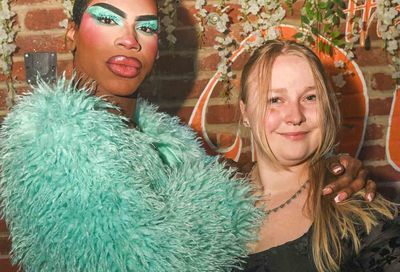Mature Mary
A perfect blend of stirring old-school soul and angsty hip-hop, Mary J. Blige's 'Growing Pains' is her album yet
The most surprising thing about Mary J. Blige’s new album, Growing Pains (), isn’t that she still gets angry — and corporeal. She is human after all, and no matter how hard she tries, all that fiery passion can’t be contained by positivity alone. No matter how much she preaches about self-worth and female independence, she isn’t above material goods and manly pursuits. As she explains on not one but two tracks, she may be a rich, grown woman, but she still wants a grown man to buy her diamonds and pearls and shoes. She might even want what Ludacris raps about here: ”a grown whoppin’.”
Well, who doesn’t?
Some 15 years after she burst onto the scene, almost instantly crowned the Queen of Hip Hop, Blige shows no sign of ending her reign. In fact, Blige becomes more and more relevant and admired by more and more people with each album she makes. Growing Pains will be nothing short of a revelation to those not already wise to Blige.
But even with her increasing relevance, and her artistic achievement, Growing Pains still offers yet a bigger surprise: The album stands as her most affecting album to date. Though here or there the lyrics become little more than positive-thinking pablum, there’s something about the way Blige regularly engages the listener on Growing Pains. She’s not just making sure you feel her pleasures and pains, as she’s done so remarkably in the past. She’s relating her experience to yours, to everyone’s, teasing out the universal elements that mark human life and love. Coupled with sharp melodies and exquisite arrangements, it adds up to a compelling album that really moves you.
And not just at the club, though several songs do that just fine, including album opener ”Work That,” where Blige eggs us on to just be ourselves. ”Follow me, follow me,” she chants in a refrain. Meanwhile, album closer ”Come to Me (Peace)” is inspirational. One of four tracks from the men behind Rihanna’s ”Umbrella” (Christopher ”Tricky” Stewart and Terius ”The Dream” Nash), this epic New Wave-inspired anthem leaves you longing for more. Blige feels the same way: She cries to her man to give her a second chance. ”I love you baby, so why don’t you stay?” Whether he accedes to her plea, it’s hard to imagine a listener denying her.
As those lyrics prove, even with music so consistently bright the album isn’t all sweetness and light. Neither is love, Blige counters. Maybe love isn’t ”an excuse for dying, a reason to live” as she describes it on ”What Love Is” — or at least, it shouldn’t be that polarizing — but it’s also certainly not all flowers and candy, as she notes on the album’s angriest track. Though chiefly a song to her lover to cut her some slack, ”Roses” also slyly acknowledges the need for self-awareness and self-help. ”If you knew how I felt on the inside, you wouldn’t say suck it up!” she tells off someone trying to help her deal with issues she clearly needs to work out alone.
Advertisement
|
Blige immediately softens the blow by letting out two hearty chuckles after she shouts ”You suck it up!” And that’s how this angry, haunted track ends — with Blige chuckling, showing refreshing candor about life. Nothing is as simple or as easy as you’d like it to be, but it takes maturity to realize that. And this is certainly a mature Mary. On yet another gorgeous track, the bossa nova-infused, tickling-ivories torcher ”Smoke,” Blige makes us swing and sigh as she copes with the reality that her lover has left. ”Why are you gone? The reason is supposed to make sense, but it don’t,” she sings.
Musically speaking, Growing Pains captures a perfect blend of stirring old-school soul and angsty hip-hop. It’s not the unaffected throwback you hear from so many of today’s neo-soul singers, nor is it overly cute and clever, trying too hard to be new. Blige told Entertainment Weekly her aim was to create an album with appeal both to her R&B base as well as to newer-found fans, who she amusingly refers to as ”the Bono listeners.” (A nod to the popularity of her dramatic remake of U2’s ”One.”) You do hear a little influence from rock and electronica, but ultimately what Blige has created is what you might call mature hip-hop soul. More than two decades old now, Blige’s genre has suffered growing pains in achieving mainstream status — just as she has.
At least with Blige’s help, hip hop’s future has never looked brighter.
Support Metro Weekly’s Journalism
These are challenging times for news organizations. And yet it’s crucial we stay active and provide vital resources and information to both our local readers and the world. So won’t you please take a moment and consider supporting Metro Weekly with a membership? For as little as $5 a month, you can help ensure Metro Weekly magazine and MetroWeekly.com remain free, viable resources as we provide the best, most diverse, culturally-resonant LGBTQ coverage in both the D.C. region and around the world. Memberships come with exclusive perks and discounts, your own personal digital delivery of each week’s magazine (and an archive), access to our Member's Lounge when it launches this fall, and exclusive members-only items like Metro Weekly Membership Mugs and Tote Bags! Check out all our membership levels here and please join us today!




























